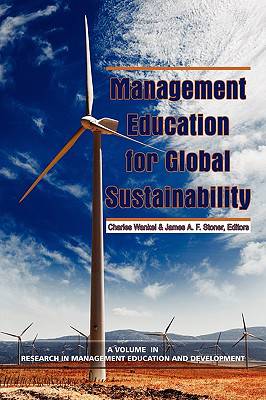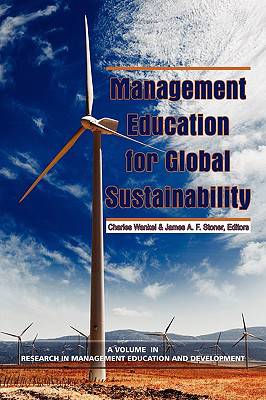
- Afhalen na 1 uur in een winkel met voorraad
- Gratis thuislevering in België vanaf € 30
- Ruim aanbod met 7 miljoen producten
- Afhalen na 1 uur in een winkel met voorraad
- Gratis thuislevering in België vanaf € 30
- Ruim aanbod met 7 miljoen producten
Zoeken
Management Education for Global Sustainability (PB)
€ 91,45
+ 182 punten
Omschrijving
For more than a century management education has fostered the development of leaders of many of the world's industrial successes with their immense creation of output that we now see as unsustainable. If we wish to avoid a time of tumultuous environmental crises in the global ecosystem management education must move more to being part of the solution, rather than of the problem. The task of transforming management education to contribute to the challenge of moving to global sustainability is upon us. Management Education for Global Sustainability provides a diverse and extensive set of perspectives on how management education can be transformed to be a significant part of the solution to the sustainability problem that business and other sectors of our world must grapple with. The spectrum of current integration of managing for sustainability into business school curricula is provided. A review of the current status sustainability oriented business degree options is completed. Approaches from around the world including China are offered. Management Education approaches through systems thinking, art, and stakeholder's theory are parsed. Specific examples of notable programs are covered, sustainable entrepreneurship for instance. A series of reports on program and institutional level initiatives that have been very successful are described. A new MBA program with a major in sustainability, integrating ocean science courses, is considered. Programs with action learning projects and industry concentrations as core elements will be analyzed. The sense of deeper purpose vibrancy and developing authentic relationships in management education for global sustainability is robust throughout this volume.
Specificaties
Betrokkenen
- Uitgeverij:
Inhoud
- Aantal bladzijden:
- 416
- Taal:
- Engels
- Reeks:
Eigenschappen
- Productcode (EAN):
- 9781607522348
- Verschijningsdatum:
- 23/07/2009
- Uitvoering:
- Paperback
- Formaat:
- Trade paperback (VS)
- Afmetingen:
- 156 mm x 234 mm
- Gewicht:
- 580 g

Alleen bij Standaard Boekhandel
+ 182 punten op je klantenkaart van Standaard Boekhandel
Beoordelingen
We publiceren alleen reviews die voldoen aan de voorwaarden voor reviews. Bekijk onze voorwaarden voor reviews.










